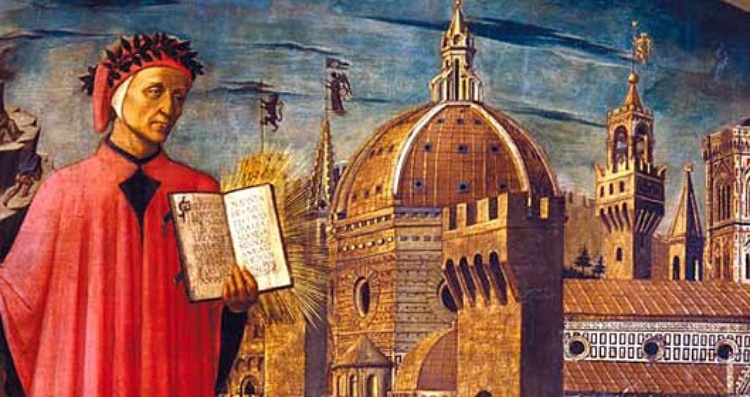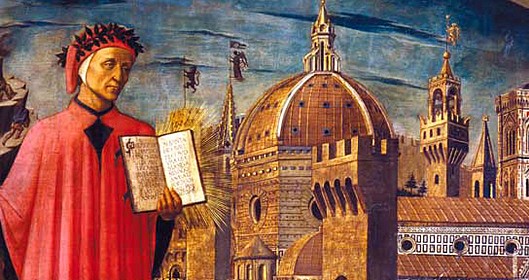The poem is an allegorical journey through sin and salvation which helped establish the Tuscan language, in which it is written, as the standardised Italian language we know today.
From October 12, poet and Italianist Dr Simon West will collaborate with the Dante Alighieri Society to take readers on a ten-week journey through the Divine Comedy, delving into the depths of one of the world’s greatest minds.
Providing an overview of Dante, his poem and his world, the English reading course is open to people of all backgrounds, while no knowledge of Italian or the text is required - all you need is enthusiasm and a willingness to read.
Dr West first stumbled upon Dante while studying Italian Literature at the University of Melbourne, where he has taught the Divine Comedy for more than 10 years now.
A wordsmith himself, Dr West was immediately eager to study Dante and learn about the mastermind behind the reputation.
“It’s approximately 700 years since Dante wrote the Divine Comedy and it seems to be just as influential today as it was back then,” Dr West explained.
“Perhaps it all starts with that first line: ‘Nel mezzo del cammin di nostra vita’ (Midway upon the journey of our life). Dante doesn’t talk about his life, he talks about our life; there’s openness in his text that can offer something to everyone.”
The Divine Comedy is a 14,000-line epic divided into three parts: Inferno (Hell), Purgatorio (Purgatory) and Paradiso (Heaven).
Dr West will commence the reading course with a general introduction to the poem as a whole, before exploring the Inferno in more depth.
Particular focus is placed on Dante’s voyage through Hell for two main reasons: firstly, this is where Dante starts his journey, so it’s only natural that readers also begin their journey there; and secondly, it is the most popular of the three parts.
“The Inferno seems to be the most well-known cantica because there are so many interesting characters that Dante meets in Hell,” Dr West said.
“They are very memorable characters who are also very evocative because they seem to encapsulate something of ourselves as well.”
The Inferno - and the Divine Comedy in its entirety - was in a sense a revolutionary text which challenged the political, religious, ethical and social norms of the time in which it was written.
Given that no manuscripts from Dante’s time survived, it’s difficult to gauge exactly how widely the Divine Comedy was diffused for the first few decades after it was written and who precisely was reading it.
It’s also tough to know the exact reaction of its readers, but one can take a guess from some of the topics Dante touches on.
“Dante is very critical of the Italian church and he situates a large number of Popes, some of whom are very contemporary to Dante himself, in his Hell,” Dr West explained.
“This is not a good advertisement for the church itself and would certainly have been a point of controversy.
“The whole concept of Purgatory was quite a new concept and no one had ever thought of Purgatory in quite as much detail as Dante, so that too might have been controversial.”
Though Dr West’s reading course will be in English, he hopes that it will encourage and inspire participants to learn some Italian and appreciate Dante’s work in its original language.
“In some ways you could say that Dante is impossible to translate because it’s written as a poem in terza rima [a rhyming verse stanza form that consists of an interlocking three-line rhyme scheme], and what rhymes in Italian doesn’t necessarily do so in English,” Dr West said.
“All of those issues relating to the poetry and the phonetics are hard to convey in English.”
Dr West also hopes to impart an idea of the beauty of the poem itself and provide the historical and cultural context needed to be fully immersed in the text.
“In some ways the language itself isn’t the main problem, it’s actually that world view of Dante’s time which is very different from now,” he said.
An expert on Dante, his work and the world in which it was written, Dr West will leave you at the end of ten weeks with a wealth of valuable knowledge and more intrigued and inspired than ever.
The Divine Comedy Course in English will run from October 12 to December 14, 2017 at the Grollo Theatre, Co.As.It.
Two Sessions are available: Thursdays at either 1:30 – 3:00pm or 6:00pm – 7:30pm .
Enrolments are still being accepted. Enquiries for enrolment to: Dante Alighieri Society Office Ph. (03) 9349 1143 or send enrolment form to 308 Drummond Street, Carlton.
For more information, enrolment forms or course flyers, visit the Dante Alighieri Society’s website.












